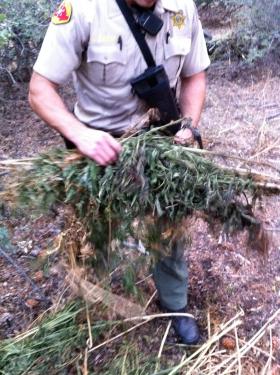
Image 1 of 3
Deputy Jeff Eveland Sunday, Oct. 24, seen here just after hiking up with Deputy Kevin Moretti from a 5-acre pot farm hidden in rugged mountain area within a half mile of Pine Mountain homes. Such farms have been found on Tejon Ranch and on U.S. Forest Service lands in Cuddy Valley and Lockwood Valley this year.
Image 2 of 3
Deputies Kevin Moretti and Jeff Eveland just after hiking back up from the site of a pot farm discovered Sunday in rugged terrain within a half mile of Pine Mountain homes.
Image 3 of 3
Dry sheaves of male plants were found—removed and left behind to let the female budding plants grow larger.
By Patric Hedlund
Two hikers came upon a pot farm harvesting operation Sunday, Oct. 24 that may span six acres in rugged terrain off of Mil Potrero Highway. The location was less than a half mile from Pine Mountain homes.
At about 4 p.m. Frazier Park substation deputies responded to a 9-1-1 call. Deputies Jeff Eveland and Kevin Moretti hiked down into the area and identified an extensive irrigation system with clear indications that the area had been used for a possibly two years or more to grow pot on a commercial scale, they said.
In an interview at about 6:50 p.m. the two deputies said that almost all the harvesting had been accomplished. They suspect the workers at the site fled when they saw the hikers and doubt they will return. No arrests were made. It appeared that all plants with commercial buds had been removed.
“This is the most dangerous time for both hikers and law enforcement,” Eveland said. During the harvest seasons, which began in August, illegal marijuana farms are often being worked by armed individuals “who are just about to convert the grow into cash,” Sgt. Michael Bonsness of the Kern County Sheriff’s Office Major Violators Unit said in an interview.
Large growing operations have been found this year in rugged areas of Tejon Ranch, Lockwood Valley, Cuddy Valley and now Pine Mountain. U.S. Forest Service lands have often been used by grow operations during the past four years, where pumps, hoses and drip lines are assembled in “ingenious ways that would make these people rich if they did something legal…,” Eveland said.
Eveland added that deputies have been trained about “booby traps” and “glassing,” when lookouts use binoculars to watch the movements of those who accidentally enter a growing area. The hikers on Sunday did exactly what Bonsness counsels anyone who comes upon black hoses and irrigation systems in the woods to do: run.
He said they should exit the area immediately, then call law enforcement to come handle the situation. Bonsness said that in growing sites planted by organized cartels, the planting and cultivation is done by one crew “paid $10,000 to $30,000 for living up in the mountains,” then they bring in “harvest crews, paid about $100 a day. They don’t trust those guys, you are talking millions of dollars worth of bud for a big grow. They bring in a boss who oversees everything. We find scales at the grow where they are weighing and packaging,” Bonsness said of operations linked to Mexican cartels. Speculation Sunday at the site off Mil Potrero Highway was that it may not have been a Mexican cartel, but “a Humboldt County type of operation.” Deputies Moretti and Eveland said a special operations group would check if toxic chemicals or other dangerous refuse had been left at the site. They said there was substantial garbage from people living in the rugged area. The growers had also rerouted mountain water sources.
KCSO had seized over 205,000 pot plants in 2010, up from 44,706 in 2006. Ten firearms have been seized with 23 arrests at grow sites this year.
This is part of the October 29, 2010 online edition of The Mountain Enterprise.
Have an opinion on this matter? We'd like to hear from you.


